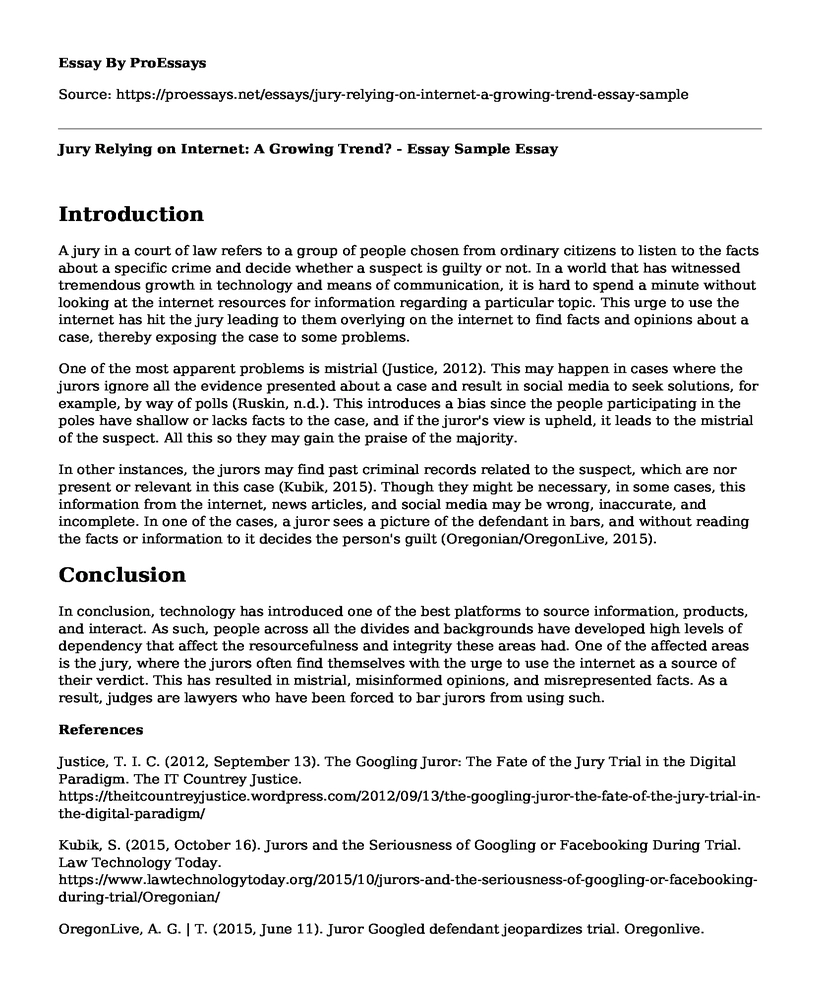Introduction
A jury in a court of law refers to a group of people chosen from ordinary citizens to listen to the facts about a specific crime and decide whether a suspect is guilty or not. In a world that has witnessed tremendous growth in technology and means of communication, it is hard to spend a minute without looking at the internet resources for information regarding a particular topic. This urge to use the internet has hit the jury leading to them overlying on the internet to find facts and opinions about a case, thereby exposing the case to some problems.
One of the most apparent problems is mistrial (Justice, 2012). This may happen in cases where the jurors ignore all the evidence presented about a case and result in social media to seek solutions, for example, by way of polls (Ruskin, n.d.). This introduces a bias since the people participating in the poles have shallow or lacks facts to the case, and if the juror's view is upheld, it leads to the mistrial of the suspect. All this so they may gain the praise of the majority.
In other instances, the jurors may find past criminal records related to the suspect, which are nor present or relevant in this case (Kubik, 2015). Though they might be necessary, in some cases, this information from the internet, news articles, and social media may be wrong, inaccurate, and incomplete. In one of the cases, a juror sees a picture of the defendant in bars, and without reading the facts or information to it decides the person's guilt (Oregonian/OregonLive, 2015).
Conclusion
In conclusion, technology has introduced one of the best platforms to source information, products, and interact. As such, people across all the divides and backgrounds have developed high levels of dependency that affect the resourcefulness and integrity these areas had. One of the affected areas is the jury, where the jurors often find themselves with the urge to use the internet as a source of their verdict. This has resulted in mistrial, misinformed opinions, and misrepresented facts. As a result, judges are lawyers who have been forced to bar jurors from using such.
References
Justice, T. I. C. (2012, September 13). The Googling Juror: The Fate of the Jury Trial in the Digital Paradigm. The IT Countrey Justice. https://theitcountreyjustice.wordpress.com/2012/09/13/the-googling-juror-the-fate-of-the-jury-trial-in-the-digital-paradigm/
Kubik, S. (2015, October 16). Jurors and the Seriousness of Googling or Facebooking During Trial. Law Technology Today. https://www.lawtechnologytoday.org/2015/10/jurors-and-the-seriousness-of-googling-or-facebooking-during-trial/Oregonian/
OregonLive, A. G. | T. (2015, June 11). Juror Googled defendant jeopardizes trial. Oregonlive. https://www.oregonlive.com/portland/2015/06/juror_googled_defendant_jeopar.html
Ruskin, W., A. (n.d.). The "Googling Juror" Has Emerged As "Massive Concern" In Courts - Litigation Blog - Litigation - LexisNexis Legal Newsroom. Www.Lexisnexis.Com. Retrieved May 4, 2020, from https://www.lexisnexis.com/LegalNewsRoom/litigation/b/litigation-blog/posts/the-googling-juror-has-emerged-as-massive-concern-in-courts
Cite this page
Jury Relying on Internet: A Growing Trend? - Essay Sample. (2023, Jul 04). Retrieved from https://proessays.net/essays/jury-relying-on-internet-a-growing-trend-essay-sample
If you are the original author of this essay and no longer wish to have it published on the ProEssays website, please click below to request its removal:
- Facts About Mobile Banking and Budgeting
- Paper Example on Children's Rights
- Who Will Graduate? Disruption of High School Education by Arrest and Court Involvement
- Case Study: Internet Placed Coupons
- Essay Sample on Main Themes and Problems in Foucault, Davis, and Agamben
- Essay Example on Lesbian Rights and BDSM: Establishing Mental Condition for Justice
- Reasons for Voting - Essay Sample







